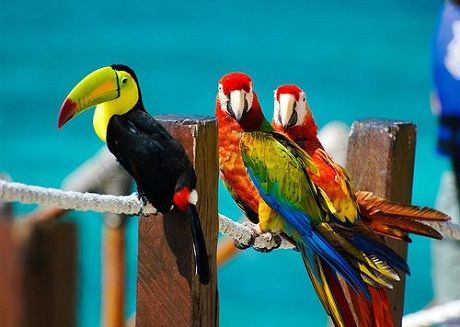GOVT. REGULATIONS FOR KEEPING EXOTIC BIRDS IN INDIA
By definition, any bird that is not of Indian origin is an Exotic bird. Parakeets, Cockatiels, Budgerigars, Macaws, Canary, Zebra Finch, Rosella and Cockatoo are some of the exotic birds in India. For years people have been in awe of exotic birds and have been admired for their bright plumage, intelligence and affable personalities.
In modern times, exotic birds have found their way into the hearts and homes of hundreds of bird lovers across the country. Budgerigars or Parakeets are some of the most popular birds in the country. Bird keepers have become aware of the birds and their lifestyle requirements. If you are a proud parent to an exotic bird, here’s how you can take care of them in the best possible way.
Food & Diet Supplements
One of the best ways to care for exotic birds is to provide them with food that is similar to their nation of origin. The food in general should be a good mixture of seeds supplemented with sprouted seeds, fruits, fresh green foods, pellets and grains based on the size and the strength of the bird’s bill. A lot of companies such as Vitapol, ZuPreem and Nekton have developed for exotic birds.
Dietary supplements are required to take care of the overall health of the birds and provide them with stronger musco – skeletal structures and digestion. Nekton specializes in bird health supplements.
Environment and ambience
Canaries, Budgerigars, Zebra Finches, Parakeets and other exotic birds are sensitive birds and care and comfort especially in the harsh and extreme climates in India.
Ideally if you have exotic birds at home, it is imperative that you provide them with shelter in a cool and calm place. The temperature in the place of their shelter should not exceed more than 28 degrees. Exotic birds are prone to developing skin problems and digestive issues if they are not provided with a clean cage or aviary. Daily cleaning of the food and water dishes is a must as it alleviates any problem due to stale food or water. The aviary or cage should be cleaned weekly (however, if you have a small bird, cleaning the aviary or cage alternate day is advised) while a monthly cleaning with a disinfectant is suggested for all cages and birds to keep them clean and infection free.
Another important part of care for exotic birds is the provision of a cage or an aviary. The cage / aviary should be big enough for the birds to be able to move freely inside the cage. The larger the bird, the bigger the cage will be. Many people set up aviaries inside the house, however if you are creating an outdoor aviary, do make sure that the aviary is in a place where there is ample amount of shade and plenty of branches / perches. You will have to make sure that the branches and the plants are not poisonous and do not have thorns or spines.
Providing ample amount of space to the birds to fly in the aviary is a must. There are a number of toys that have been specially designed to keep the birds mentally and physically engaged. Most of the toys are made of soft wood and rope and are attractive in nature.
Birds thrive on love and care and do well in a family where they interact with the family and are taught new things and commands.
The union ministry of environment and forest has made registration and ownership certificate mandatory for rearing exotic pet birds and animals. The owners must inform the forest department on birth and death of exotic livestock.
People who sell and purchase such creatures are obliged to follow the new rules issued by the ministry. If any exotic bird or animal escapes from the cage, owner will face legal action. The ministry of environment and forest directed the states to take immediate action for the welfare of the exotic live species based on the guidelines issued in the Convention on International trade in Endangered Species (CITES) of Wild Fauna and Flora. As per the new rules, those who own exotic birds or animals should report the matter to the concerned authority. The CITES is part of a multilateral treaty that includes plant, animals and birds under varying categories of the threat of extinction and which will be jointly protected by members of the International Union for Conservation of Nature. 187 countries are members of CITES. The treaty under CITES aims to restrict the illegal trade of animals. Registration is mandatory for all creatures listed as three categories by CITES.
Health card of animals/birds and No Objection Certificate of chief wildlife warden are mandatory for importing the exotic breeds. Those who purchase or sell such creatures must register it. After confirming the creatures are not suffering from any disease, the owners can hand it over to any zoo.
If any animal or bird escapes from the owner’s residence, chief wildlife warden or related officials must be informed. The exotic breeds should not be allowed to mate with native breeds. If such birds or animals are taken to another state, the owner must inform the matter to the forest department.
Registration
People who own exotic birds or animals are advised to register in the following website:
Chief wildlife warden of states will issue the ownership certificate.
Declare exotic pets, avoid prosecution
The Supreme Court has upheld an Allahabad High Court order granting immunity from investigation and prosecution if one declared illegal acquisition or possession of exotic wildlife species between June and December 2020.
The Ministry of Environment, Forest and Climate Change (MoEFCC) has come out with an advisory on a one-time voluntary disclosure scheme that allows owners of exotic live species that have been acquired illegally, or without documents, to declare their stock to the government between June and December 2020.
With this scheme, the government aims to address the challenge of zoonotic diseases, develop an inventory of exotic live species for better compliance under the Convention on International Trade in Endangered Species of Wild Fauna and Flora (CITES), and regulate their import.
What kind of exotic wildlife is covered?
- The advisory has defined exotic live species as animals named under the Appendices I, II and III of the CITES.
- It does not include species from the Schedules of the Wild Life (Protection) Act 1972.
- A plain reading of the advisory excludes exotic birds from the amnesty scheme.
CITES:
- CITES is an international agreement between governments to ensure that international trade in wild animals, birds and plants does not endanger them.
- India is a member.
- Appendices I, II and III of CITES list 5,950 species as protected against over-exploitation through international trade.
- Many of these animals, such as iguanas, lemurs, civets, albino monkeys, coral snakes, tortoises, are popular as exotic pets in India.
How big a problem is illegal trade of exotic animals in India?
- The Directorate of Revenue Intelligence (DRI), which enforces anti-smuggling laws, says India has emerged as a big demand centre for exotic birds and animals with an increase in smuggling of endangered species from different parts of the world.
- Most of this exotic wildlife is imported through Illegal channels and then sold in the domestic market as pets.
32,645 Indians, across 25 states and five union territories, have admitted to having live, exotic species in their possession following a government disclosure scheme announced last year.
People have declared possession of exotic bird, reptile, amphibian, and mammalian species, such as kangaroos, lemurs, rhinoceros iguanas, macaws, and lovebirds, among others. West Bengal topped the list with the highest volume — 30% — of declarations, followed by Kerala, Tamil Nadu, and Maharashtra, IndiaSpend reports.
The disclosures include information about the possession of endangered species, too, like the black-and-white ruffed lemur endemic to Madagascar, and the beisa, an antelope endemic to eastern Africa.
Last June, while the world was caught in the eye of the global health crisis caused by a zoonotic disease, the central government issued an advisory introducing a voluntary disclosure scheme urging citizens to declare possession of any exotic, i.e., non-native, live species.
“This is the first step in controlling the illegal pet trade. … Exotics are a major problem for us because of invasive species and possible ecological imbalance if they are released in the wild,” Jose Louise, who heads the wildlife crime prevention unit for the Wildlife Trust of India, explained to The Hindu at the time.
Ecological imbalance can be triggered by exotic species invading local ecosystems — as seen already in the case of invasive, non-native species of trees erasing endemic biodiversity across the Western Ghats. But non-native animal species also pose the threat of zoonotic diseases.
Under this ‘amnesty scheme,’ individuals who declared acquisition or possession of exotic species within the six-month window of June to December 2020 cannot be prosecuted for the same. But some reports have pointed out a lack of clarity on whether the individuals who have made disclosures can be prosecuted over the means or manner of acquisition or possession by authorities outside the environment ministry, such as revenue intelligence bodies.
But what is known is that once the six-month window has closed, the government has the liberty to introduce a regulatory, and even penal, code governing the trade of exotic species.
“The major reason to do this is to regulate the trade because zoonotic diseases are linked to wildlife. With this advisory, we will know how many such exotic animals are there in the country,” Soumitra Dasgupta, inspector general of the environment ministry’s wildlife division, told Down To Earth last year after the scheme was announced.
Dasgupta explained the exercise was an endeavor to bring exotic animal imports within the purview of forest departments — to help keep the authorities “in the loop.”
Experts also believe the advisory could potentially act as a disabler of the wildlife trade in India since, until now, forest officers couldn’t control the trade because non-native species weren’t protected under India’s Wildlife Protection Act of 1972.
Which Exotic Animals Can You Legally Keep in India?
Laws Governing Pet Animals in India
There are no specific laws in India that establish laws on pets. However, there is a negative list, which means some animals cannot be used as pets in India. This needs to be considered first.
Some laws and legal interpretations have to be adopted to apply the available Indian laws to pets. Reading all of these together will be a law for pets in India.
Here are some sections that should be studied:
- Convention on International Trade in Endangered Species
- The Animal Cruelty Prevention Act of 1960 and its regulations
- The Nature Conservation Act of 1972
- The Penal Code of India 1860
Convention on International Trade in Endangered Species
Parrots can be considered common pets. However, Blue-winged parrots, African gray parrots, and yellow cockatoos are preserved by foreign trade under the Agreement on International Trade in Endangered Species of Wild Plant and Animal Life
PDF OF DEALING WITH IMPORT OF EXOTIC LIVES SPECIES IN INDIA AND SOP FOR APPLICANTS CAN BE DOWNLOADED FROM HERE:
DEALING WITH IMPORT OF EXOTIC LIVE SPECIES IN INDIA AND
PDF OF VETERINARY CERTIFICATE FOR IMPORT OF CAPTIVE BIRDS OTHER THAN POULTRY CAN BE DOWNLOADED FROM HERE:
VETERINARY CERTIFICATE FOR IMPORT OF CAPTIVE BIRDS (other than
Reference-On Request.
https://www.pashudhanpraharee.com/care-management-of-parrots-pet-birds/




